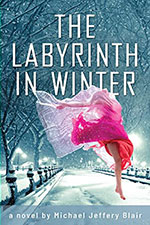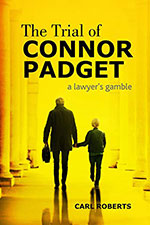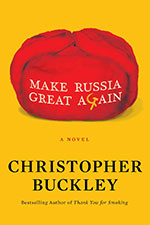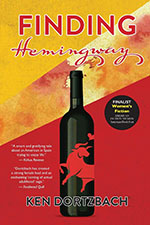 VERDICT: It’s a Keeper
VERDICT: It’s a Keeper
The Labyrinth in Winter
By Michael Jeffery Blair (Los Angeles, CA: Novabook, 2020). Novel. 338 pgs. $15.95. Order, www.amazon.com.
Reviewed by Mandi Florip
The words “intricacy” and “perplexity” are often associated with a labyrinth, and quite fittingly, can also be associated with the language within this book. Author Michael Jeffery Blair has an artistic flair with his word choices as he marries phrases that, to fully appreciate their beauty, require multiple readings.
Released in March 2020, this chilling story unravels in New York City when U.S. Securities and Exchange Commission investigating attorney Devlin Wolfe discovers a dead body floating in the Harlem River, while on his morning rowing workout. As an avid morning runner, I relish the stillness that can be found before the world gets moving. Wolfe, however, did not find solace that dreadful morning when he discovered the body that would blight his existence.
Two story lines weave throughout this novel, both set in subzero temperatures. Readers can feel the depth of winter that encapsulates the characters, as the daylight is limited and the skies are too cold to open for snow.
The first focuses on Wolfe as he embarks on a whodunit adventure, stumbling into financial scandals and unscrupulous individuals. His friendship with New York City police detective Thierry Reynard provides light to his character as he teams up with the law in the search of justice. Through discussions with Reynard, Wolfe simplifies complex SEC issues and financial scandals so that readers can understand the intricate crimes that are the foundations of this story.
Want to Review a Book?
Please request a book and writing guidelines from Wisconsin Lawyer managing editor Karlé Lester, at klester@wisbar.org or (608) 250-6127. Reviewers may keep the book reviewed. Reviews of about 500 words are due within 45 days of receiving the book. Reviews are published, space permitting, in the order received and may be edited for length and clarity.
The victim, Guillaume Marchand, is revealed to be a financial analyst for an international technology firm. Soon after his death, his home burns down and his wife disappears, beginning Wolfe’s journey to uncover the truth.
The second story line features Bixby Endicott, the former boss of the deceased gentleman. A man of great wealth, he has recently found a love for the opera. His story line takes readers through a spiral of a financial and emotional obsession with the opera and specifically a problematic French woman who is preparing to give her operatic debut performance in the United States.
The two main characters showcase an extreme dichotomy in their monetary status, perceptions of justice, and inherent value systems. As the book unfolds, the plotlines begin to overlap as the two men walk parallel narratives filled with an undercurrent of financial wealth and greed cloaked in generosity.
Despite the darkness that runs through the characters, they are likeable as they struggle through tangible issues. This book brings out facets of the legal profession and lifestyles that will both challenge and humble attorney readers. With the complex nature of the writing, I would not consider this a light read, but the swirling plotlines and multifaceted characters make it worth the investment.
Mandi Florip, John Marshall 2011, is a local government attorney licensed in Illinois and Wisconsin.
 VERDICT: Not for Me, Maybe for You
VERDICT: Not for Me, Maybe for You
The Trial of Connor Padget: A Lawyer’s Gamble
By Carl Roberts (Columbus, OH: Gatekeeper Press, 2019). Novel. 237 pgs. $7.76. Order, www.amazon.com.
Reviewed by Greg C. Anderson
Although I enjoyed this novel for its depiction of a southern lifestyle within certain social circles, it wasn’t the legal thriller that I anticipated. The book’s title, The Trial of Connor Padget, is somewhat misleading. Connor Padget is the defendant in a murder trial, but he is merely a supporting character in the story. The protagonist is Padget’s attorney, Jack Carney, a civil litigator who faces a crisis in both his professional career (his firm won’t handle criminal cases) and his personal life (a failing marriage) while the trial unfolds.
The novel is promoted as a courtroom thriller. However, readers expecting something along the lines of a John Grisham or Scott Turow novel will be disappointed. There is never any doubt as to the defendant’s guilt: He shoots a person in public in front of TV cameras on page two of the book. The courtroom action takes up very little of the book and includes some unlikely evidentiary decisions more reminiscent of TV legal dramas than actual courtrooms. The story includes many details about the protagonist’s lifestyle (lots of discussion of food and drink) and a high degree of coincidences to move the story along.
This novel is self-published. As such, it is unclear whether it went through the normal editing process typical of traditional publishing houses. It contains a large amount of reminiscing by the main character about his childhood, high school experiences, and military life before law school. The character development is interesting but doesn’t always help move the plot along.
What we have here is a question of the reader’s expectations. If you are looking for a courtroom thriller, you might want to look elsewhere. If instead you want a story about an individual dealing with overlapping personal and professional conflicts, you might want to add this to your reading list.
Greg C. Anderson, U.W. 1985, is an assistant dean at Northern Illinois University College of Law.
 VERDICT: Not for Me, Maybe for You
VERDICT: Not for Me, Maybe for You
Make Russia Great Again
By Christopher Buckley (New York, NY: Simon & Schuster, 2020). Novel. 234 pgs. $20.63. Order, www.amazon.com.
Reviewed by Matthew Hallingstad
Several years ago, after a quarter-century of writing political satire, author-satirist Christopher Buckley abandoned the genre, realizing that American politics had become “self-satirizing.” Somewhat inexplicably, he returned to the genre in 2020, a year in which it could be argued that truth was stranger than fiction and the distinctions between reality and headlines from The Onion were hard to find.
Make Russia Great Again, a send-up of the Trump administration, is in the form of a memoir written by Trump’s fictional seventh chief of staff, Herb Nutterman. It flips the dynamic of 2016’s election; this time, America interferes in a Russian election, though somewhat inadvertently. The “memoir” centers on the administration’s response and Nutterman’s self-identified “Rubicon moment,” a historical reference later used by QAnon and others pushing real-world Trump to fight election results (#crosstherubicon). Uncanny.
Make Russia Great Again features a cast of characters that are familiar in name (for example, Reince Priebus, Rudy Giuliani) or character (for example, South Carolina Senator Squigg Lee Biskitt, Fox News anchor Seamus Colonnity). Assessing the accuracy of Buckley’s portrayals is the most enjoyable aspect of the book, and, to his credit, Buckley is generally spot-on. Jored Kushner is an “odd duck” who “looked like his own Madam Tussaud” waxwork. Sen. Biskitt openly wonders whether he “has not disgraced himself sufficiently in the service of Donald Trump.” Rudy, wanted by the Department of Justice for “injurious punditry and pernicious legal representation,” belonged in an asylum, instead of seeking asylum, per Trump.
Of course, Trump is the center of attention throughout the book, a “stable genius [with] so many brilliant ideas, he simply couldn’t keep track of them all” and who would, as a “consequence of his superior intellect,” regularly forget his “brilliant ideas [that] no one else [c]ould have [even] come up with.” Trump enjoyed watching the carnage of an attempted assassination and reminds Nutterman that it is just as important to lie about small things as big.
While the portrayals are accurate and there were a few LOL moments scattered throughout the book (even Gwyneth Paltrow gets a humorous mention), the real-world events that occurred before and after the election make the most dramatic events in the book, which include an attempted coup, a potential second impeachment, a possible refusal to concede followed by military removal, and the eventual election-less installation of Trump Jr., seem rather ho-hum. The book jacket claims that what happens to Nutterman is “outrageous, outlandish, and completely unbelievable,” but the chain of events is almost too believable and, in many cases, quite a bit more normal than what was happening in the real world.
As such, it feels unnecessary to spend time in Buckley’s alternative reality. If one wishes to dabble in the absurd, one merely need read one of the books written by those who were involved in the actual Trump administration, read or watch the news, or open Twitter. In the end, Buckley had it right when he labeled American politics as “self-satirizing”; he picked an inopportune time to recant.
Matthew Hallingstad, U.W. 2005, practiced law for five years and now helps ensure that you get your Amazon packages on time.
 VERDICT: A Tree Died for This?
VERDICT: A Tree Died for This?
Finding Hemingway
By Ken Dortzbach (Brookfield, WI: Cloister Inn Publishing, 2020). 379 pgs. $12.75. Order, www.amazon.com.
Reviewed by Ryan Platt
I picked up this book hoping to get some insight into Hemingway, the practice of law, or a connection between the two. Sadly, the work provides none of these. Nevertheless, the book’s mere existence is testament to Hemingway’s continuing appeal – and if Ken Dortzbach, protagonist Callie McGraw, and I are any indication, it is an appeal that holds particular sway with lawyers.
The book’s protagonist-narrator is Callie McGraw, a seasoned corporate attorney with a love for Hemingway and the sound of her own name. Callie heads to Spain on the advice of a surprise from-the-grave phone call from Ernest Hemingway. In fact, Hemingway’s voice is less like the Nobel laureate brilliantly captured by Lillian Ross and more like the voice from Field of Dreams.
While in Spain, Callie befriends Trevor, a graduate school dropout who, after striking up a conversation with her, takes no initiative whatsoever for nearly the entire book. Callie and Trevor proceed to wander platonically around Spain together. Callie is obsessed with The Sun Also Rises, going so far as to call the book her “salvation,” and causes a scene storming away from any dinner table where anyone dares question the book’s greatness or suggest the heresy that Don Quixote is a superior novel.
Callie and Trevor wander through Barcelona and Madrid before meeting Claudio, a wealthy madrileño who teaches Callie how to cook at his penthouse apartment. Relations between Callie and Claudio proceed predictably, and Trevor is doomed to awkwardly third-wheel his way through the rest of the book. At some point, Callie gets terribly mad at Claudio and takes a French lover, Jean-Pierre, to get back at him. The four of them proceed to have many cringe-worthy dinners at which Jean-Pierre and Claudio seem incapable of discussing anything beyond which country’s cuisine is better. These dinners and dialogues are the weakest part of the novel. The characters seem flat, and Callie at times seems less like a hardened attorney who thrived in New York City for five years and more like a high schooler going through her first breakup.
It’s true that The Sun Also Rises illustrates a lifestyle that many lawyers find immensely seductive. Sipping wine in open-air cafes and living a life without consequence often seems an attractive contrast to the stress of handling legal matters. And the scene Callie creates for herself does have a superficial resemblance to Sun as she gallivants around Spain. The novel’s greatest strength is that it shows that the lifestyle we imagine when we read The Sun Also Rises often is not as romantic when it’s lived in reality.
Without giving too much away, I’ll say that Callie gets the kind of ending that Jake Barnes and Lady Brett Ashley could only dream of. The enduring appeal of The Sun Also Rises is that it makes readers feel the pain of imagining a happy life just out of reach. That Callie reaches it also does not feel real. But, in a strange way, that is Dortzbach’s goal. He is giving some of Hemingway’s characters, or at their least modern-day facsimiles, the happy ending they were never destined to have. As Jake Barnes would say, “Isn’t it pretty to think so?”
Ryan Platt, U.W. 2015, is a worker’s compensation and personal injury attorney at Dworkin & Maciariello, Chicago.
